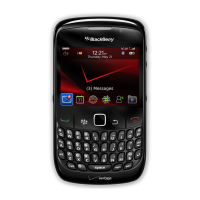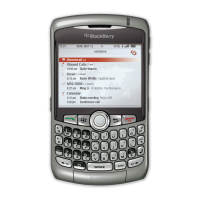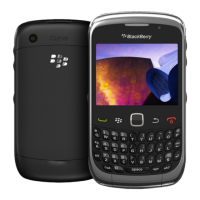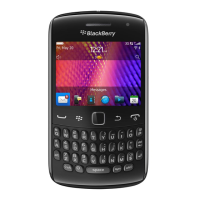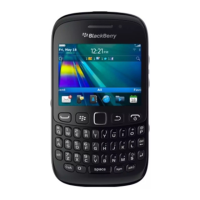Do you have a question about the Blackberry Curve 8520 and is the answer not in the manual?
Learn fundamental shortcuts for navigating and interacting with your BlackBerry device.
Discover shortcuts for making calls, managing volume, and using speakerphone features.
Master shortcuts for replying, forwarding, filing, and navigating messages efficiently.
Learn shortcuts for searching text within attachments and navigating them.
Explore shortcuts for taking pictures and recording videos on your device.
Utilize shortcuts for playing media, navigating pictures, and controlling playback.
Navigate web pages and manage browser functions using quick shortcuts.
Streamline calendar management with shortcuts for scheduling and viewing events.
Enhance typing efficiency with shortcuts for symbols, text manipulation, and character input.
Quickly find contacts, messages, attachments, and web pages using dedicated shortcuts.
Navigate maps and routes efficiently using convenient keyboard shortcuts.
Understand fundamental phone operations, including finding your number and making calls.
Learn to adjust call volumes and improve sound quality for calls on your device.
Manage your voice mail, including checking and changing access numbers.
Set up and manage speed dial contacts for quick calling.
Control your phone functions using voice commands for hands-free operation.
Learn to set up and manage conference calls for group communication.
View, add notes to, and manage your call history for tracking communications.
Enable and manage call waiting to handle multiple incoming calls.
Configure call forwarding to redirect incoming calls to another number.
Manage call blocking settings to prevent unwanted incoming or outgoing calls.
Utilize fixed dialing to restrict calls to a predefined list of contacts.
Configure smart dialing options for easier and more efficient call placement.
Understand TTY support for text-based communication over phone lines.
Customize phone settings, including lock screen dialing and call log display.
Resolve common issues related to making and receiving calls on your device.
Learn essential message composition techniques, including spelling and saving drafts.
Manage email messages, including sending, filing, and managing folders.
Understand and send PIN messages for direct communication between BlackBerry devices.
Send and manage SMS text messages, including options for delivery and history.
Send and manage MMS messages, including media attachments and slide shows.
Customize how messages are displayed and managed in your message lists.
Secure your messages using S/MIME for signing and encryption.
Enhance message security with PGP encryption and digital signatures.
Utilize shortcuts for efficient message handling, including replying and forwarding.
Understand how to view, download, and manage various types of file attachments.
Open and view password-protected PDF files and tracked changes in documents.
Navigate and manage spreadsheets, including moving to cells and changing display options.
View and switch pages in multi-page files and manage presentations.
Handle vCard attachments to view and add contact information.
Resolve issues with attachments not appearing or content bars being skipped.
Learn how to capture photos using your device's camera.
Adjust your view within a picture by panning.
Magnify or reduce the view of a picture for detailed inspection.
Capture video clips using your device's video camera.
Configure settings for picture size, quality, video size, and format.
Address issues like not being able to save media or blurry pictures.
Connect your device to a computer to transfer and manage media files.
Play audio and video files, and record voice notes on your device.
Organize media files by creating playlists, renaming, and moving files.
View pictures individually, as a slideshow, or set them as your Home screen background.
Configure options for media cards, including formatting and encryption.
Resolve issues with playing media, recognizing media cards, or incorrect ring tones.
Learn to navigate web pages, search the internet, and switch browser views.
Manage bookmarks for web pages, including adding, changing, and sending them.
Subscribe to and view web feed content for updates on various topics.
Configure browser settings like default view, home page, and JavaScript options.
Manage browser security settings, including TLS and WTLS configurations.
Configure browser push settings to receive information from web applications.
Resolve issues with browser availability and bookmark synchronization.
Manually set the date and time or synchronize automatically with the network.
Customize the appearance of the clock face, stopwatch, and timer.
Enable bedside clock mode for uninterrupted viewing of the clock.
Set and manage alarms, including snooze and notification options.
Troubleshoot issues with incorrect device time or alarm settings.
Manage contacts, including adding, editing, deleting, and customizing them.
Create and manage mailing lists for sending messages to groups of contacts.
Manage appointments, meetings, and alarms using calendar views and settings.
Create and manage tasks, including setting due dates and recurrence.
Create and manage memos for jotting down notes and reminders.
Organize contacts, tasks, and memos into categories for easier management.
Use the device's calculator for basic arithmetic and unit conversions.
Understand notification profiles and how they alert you to device events.
Set custom ring tones for contacts or notification profiles.
Easily switch between different notification profiles for various situations.
Create custom notification profiles tailored to your preferences.
Modify existing notification profiles to adjust alert settings.
Control notifications during active calls to avoid interruptions.
Understand LED indicators for device status and notifications.
Set custom notifications for specific contacts or message types.
Resolve issues with device vibrations, notifications, or profile exceptions.
Learn fundamental typing methods, including symbols and text manipulation.
Switch between typing input methods like SureType and multi-tap.
Utilize SureType and multi-tap methods for Arabic and Russian text input.
Check spelling in messages, entries, and memos for accuracy.
Add custom words to the dictionary to improve spelling recognition.
Create and manage AutoText entries to replace common text with shortcuts.
Address issues related to spelling checks and typing input methods.
Set the language for your device's display and interface.
Add support for additional display languages to your device.
Understand how typing input languages affect text entry and AutoText.
Set the input language for typing, which may differ from the display language.
Switch between typing methods like SureType and multi-tap.
Customize SureType technology settings for improved text input.
Resolve issues with character display related to server or service provider support.
Adjust screen and keyboard backlighting brightness and timeout settings.
Customize display settings, including Home screen background and font.
Configure keyboard sounds, cursor speed, and assign applications to convenience keys.
Manage device themes to customize the appearance of your interface.
Adjust display settings for better accessibility, such as reverse contrast.
Resolve issues with screen turning off, display changes, or convenience key functions.
Search for messages, attachments, and web content efficiently.
Search for organizer data such as contacts, calendar entries, and tasks.
Use shortcuts to quickly initiate searches for contacts, messages, and text.
Understand how to synchronize organizer data and email messages wirelessly.
Set up wireless reconciliation for email messages between device and computer.
Configure automatic deletion of email messages over the wireless network.
Synchronize organizer data wirelessly between your device and computer.
Understand and manage synchronization conflicts for email and organizer data.
Learn how to back up and restore device data using BlackBerry Desktop Manager.
Securely wipe all data from your device, including third-party applications.
Resolve issues with email reconciliation and data synchronization.
Understand Bluetooth technology and how to pair devices.
Enable Bluetooth connectivity on your device.
Connect your device to Bluetooth enabled devices like headsets or car kits.
Establish a connection with an already paired Bluetooth device.
Seamlessly switch to a Bluetooth device during an ongoing call.
Receive media files from Bluetooth enabled devices.
Configure options for contact sharing, outgoing calls, and device discoverability.
Understand various Bluetooth profiles like HSP, HFP, and A2DP.
Resolve issues with passkeys, device pairing, and Bluetooth connections.
Learn about using GPS for location services and applications.
Retrieve your current GPS location and coordinates.
Disable location aiding to manage data service charges while improving GPS performance.
Troubleshoot issues with GPS technology not working correctly.
Get directions, view routes on maps, and send map information.
Use GPS to track your movement and geotag pictures with location data.
Bookmark locations and routes for quick access and organization.
Configure map cache, display status information, and set GPS receiver.
Resolve issues with diagonal lines on maps and feature availability.
Manage contacts, invitations, and groups within BlackBerry Messenger.
Start, open, copy, clear, and broadcast conversations with contacts.
Manage your availability status, display name, and phone presence.
Resolve issues with conversations, pings, and availability status.
Switch between running applications on your device for multitasking.
Download and install new applications onto your device.
Inspect the details and properties of installed applications.
Remove third-party applications that are no longer needed.
Configure prompts for installing applications when a device password is set.
Understand the reasons and process for updating your device software.
Revert to a prior version of device software if needed.
Resolve issues with adding or updating applications on your device.
Understand indicators for wireless signal strength and network status.
Disable wireless connections for specific situations like airplane mode.
Manage preferred wireless networks for automatic or manual connection.
Control data service usage, especially when roaming internationally.
Learn how to connect to Wi-Fi networks and manage Wi-Fi profiles.
Configure security settings for Wi-Fi connections, including encryption types.
Resolve issues with connecting to wireless or Wi-Fi networks.
Learn methods to power off your device, including automatic shutdown.
Perform a device reset by removing and reinserting the battery.
Tips for optimizing battery life and device performance.
Format device memory or media cards, which erases all stored files.
Check the available memory on your device and media card.
Guidelines for maintaining optimal device performance by managing memory.
Access and manage contacts stored on your SIM card.
Transfer contacts from your SIM card to your device's contact list.
Edit or delete contacts stored on your SIM card.
Configure your SIM card to store SMS text messages.
Protect your SIM card with a PIN code for enhanced security.
Enable SIM card security by setting a PIN code.
Modify or reset your SIM card's PIN code.
Understand device passwords, keyboard locking, and password attempt limits.
Securely store and manage passwords using the password keeper.
Encrypt files on your device and media card for data protection.
Enable content protection and manage encryption keys for device security.
Configure memory cleaning to automatically delete sensitive data.
Manage digital certificates, including downloading and viewing properties.
Manage PGP keys for secure email communication and data exchange.
Configure connections to certificate servers for authentication and verification.
Manage keys, certificates, and passwords stored in the device's key store.
Use smart cards for authentication, security, and two-factor authentication.
Manage software tokens for VPN login and secure network access.
Configure VPN profiles for secure access to networks.
Set permissions for third-party apps, controlling their access to data and features.
Resolve issues with certificates, smart card unlocking, and network connections.
Manage service books that determine available device services.
Run, view, submit, and delete diagnostic reports for network troubleshooting.
Submit and manage Wi-Fi diagnostic reports for network issue resolution.
Understand the objective and gameplay of BrickBreaker.
Learn about the different capsules that enhance gameplay in BrickBreaker.
Understand the scoring system and points awarded for actions in BrickBreaker.
Learn how to control the paddle and interact with game elements.
| Panel type | TFT |
|---|---|
| Display diagonal | 2.46 \ |
| Display resolution | 320 x 240 pixels |
| Display number of colors | 65536 colors |
| Ringer type | Polyphonic |
| Processor frequency | 0.512 GHz |
| Internal memory | 256 MB |
| Digital zoom | 5 x |
| Rear camera type | Single camera |
| Headphone connectivity | 3.5 mm |
| USB 2.0 ports quantity | 1 |
| Multimedia Messaging Service (MMS) | Multimedia Messaging Service (MMS) is a standard way to send messages that include multimedia content to and from a mobile phone over a cellular network |
| Personal info management (PIM) | Alarm clock, Calendar |
| Platform | BlackBerry |
| Operating system installed | BlackBerry OS |
| Form factor | Bar |
| Product color | White |
| Talk time (2G) | 4.5 h |
| Battery capacity | 1150 mAh |
| Standby time (2G) | 408 h |
| Keyboard layout | QWERTY |
| 2G standards | EDGE, GPRS |
| Bluetooth version | 2.0+EDR |
| Depth | 13.9 mm |
|---|---|
| Width | 60 mm |
| Height | 109 mm |
| Weight | 105 g |

